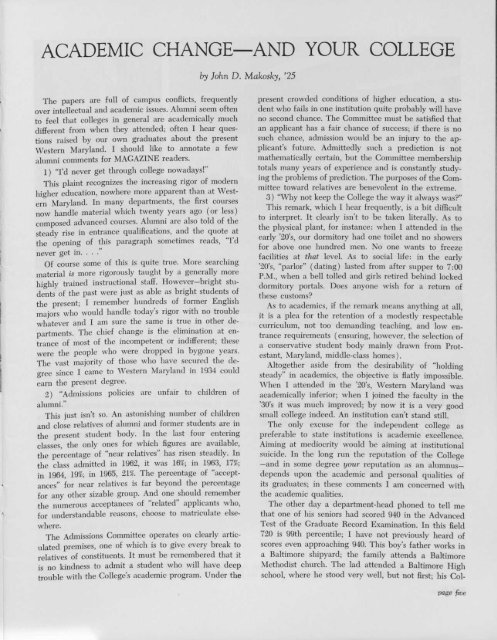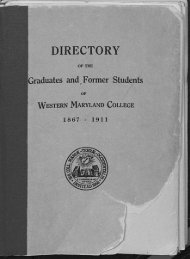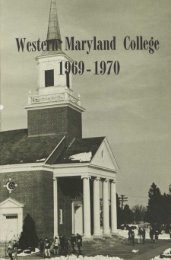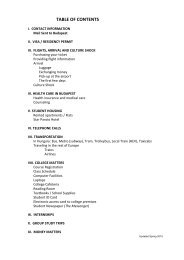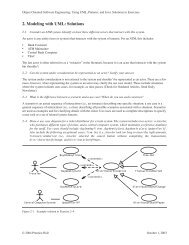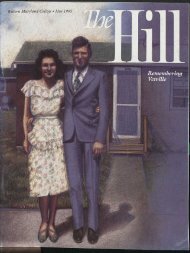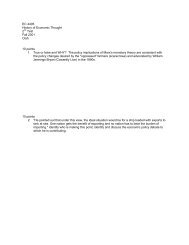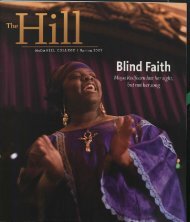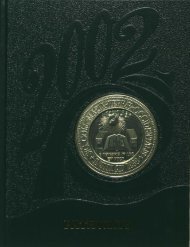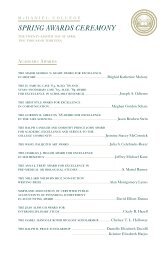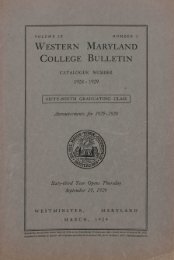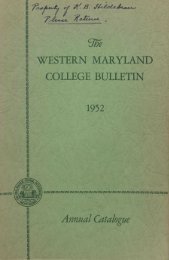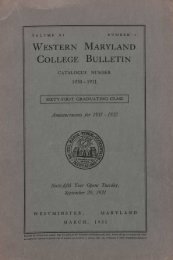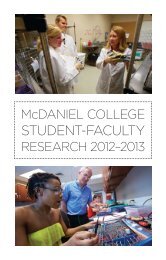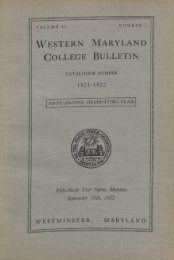Create successful ePaper yourself
Turn your PDF publications into a flip-book with our unique Google optimized e-Paper software.
ACADEMIC CHANGE-ANDby John D. Makosky, '25YOUR COLLEGEThe papers are full of campus conflicts, frequentlyover i.ntellectualand academic issues. Alumni seem oftento feel that colleges in general are academically muchdifferent from when they attended; often I hear questionsraised by our own graduates about the presentwestern Maryland. 1 should like to annotate a fewalumni comments for MAGAZINE readers.1) "I'd never get through college nowadays!"This plaint recognizes the increasing rigor of modernhigher education, nowhere more apparent than at westernMaryland. In many departments, the first coursesnow handle material which twenty years ago (or less)composed advanced courses. Alumni are also told of thesteady rise in entrance qualifications, and the quote atthe opening of ~hiS paragraph sometimes reads, "I'dnever get in.Of course some of this is quite true. More searchingmaterial is more rigorously taught by a generally morehighly trained instructional staff. However-bright studentsof the past were just as able as bright students ofthe present; I remember hundreds of fonner Englishmajors who would handle tcduy's rigor with no troublewhatever and I am sure the same is true in other departments.The chief change is the elimination at entranceof most of the incompetent or indifferent; thesewere the people who were dropped in bygone years.The vast majority of those who have secured the degreesince I came to Western Maryland in 1934 couldearn the present degree.2) "Admissions policies are unfair to children ofalumni."This just isn't so. An astonishing number of childrenand close relatives of alumni and former students are inthe present student body. In the last four enteringclasses, the only ones for which figures are available,the percentage of "near relatives" has risen steadily. Inthe class admitted in 1962, it was 16%;in 1963, 17%;in 1964, 19%;in 1965, 21%.The percentage of "acceptances"for near relatives is far beyond the percentagefor any other sizable group. And one should rememberthe numerous acceptances of "related" applicants who,for understandable reasons, choose to matriculate elsewhere.The Admissions Committee operates on clearly articulatedpremises, one of which is to give every break torelatives of constituents. It must be remembered that itis no kindness to admit a student who will have deeptrouble with the College's academic program. Under thepresent crowded conditions of higher education, a studentwho fails in one institution quite probably will haveno second chance. The Committee must be satisfied thatan applicant has a fair chance of success; if there is nosuch chance, admission would be an injury to the applicant'sfuture. Admittedly such a prediction is notmathematically certain, but the Committee membershiptotals many years of experience and is constantly studyingthe problems of prediction. The purposes of the Committeetoward relatives are benevolent .in the extreme.3) "Why not keep the College the way it always was?"This remark, which I hear frequently, is a bit difficultto interpret. It clearly isn't to be taken literally. As tothe physical plant, for instance: when I attended in theearly '20's, our dormitory had one toilet and no showersfor above one hundred men. No one wants to freezefacilities at that level. As to social life: in the early'20's, "parlor" (dating) lasted from after supper to 7:00P.M., when a bell tolled and girls retired behind lockeddormitory portals. Does anyone wish for a return ofthese customs?As to academics, if the remark means anything at all,it is a plea for the retention of a modestly respectablecurriculum, not too demanding teaching, and low entrancerequirements (ensuring, however, the selection ofa conservative student body mainly drawn from Protestant,Maryland, middle-class homes).Altogether aside from the desirability of "holdingsteady" in academics, the objective is flatly impossible.When I attended in the '20's, Western Maryland wasacademically inferior; when I joined the faculty in the'30's it was much improved; by now it is a very goodsmall college indeed. An institution can't stand still.The only excuse for the independent college aspreferable to state institutions is academic excellence.Aiming at mediocrity would be aiming at institutionalsuicide. In the long run the reputation of the College=nnd in some degree youI' reputation as an alumnusdependsupon the academic and personal qualities ofits graduates; in these comments 1 am concerned withthe academic qualities.The other day a department-head phoned to tell methat one of his seniors had scored 940 .in the AdvancedTest of the Graduate Record Examination. In this field720 is 99th percentile; 1 have not previously heard ofscores even approaching 940. This boy's father works ina Baltimore shipyard; the family attends a BaltimoreMethodist church. The lad attended a Baltimore Highschool, where he stood very well, but not first; his Col-pagefive


